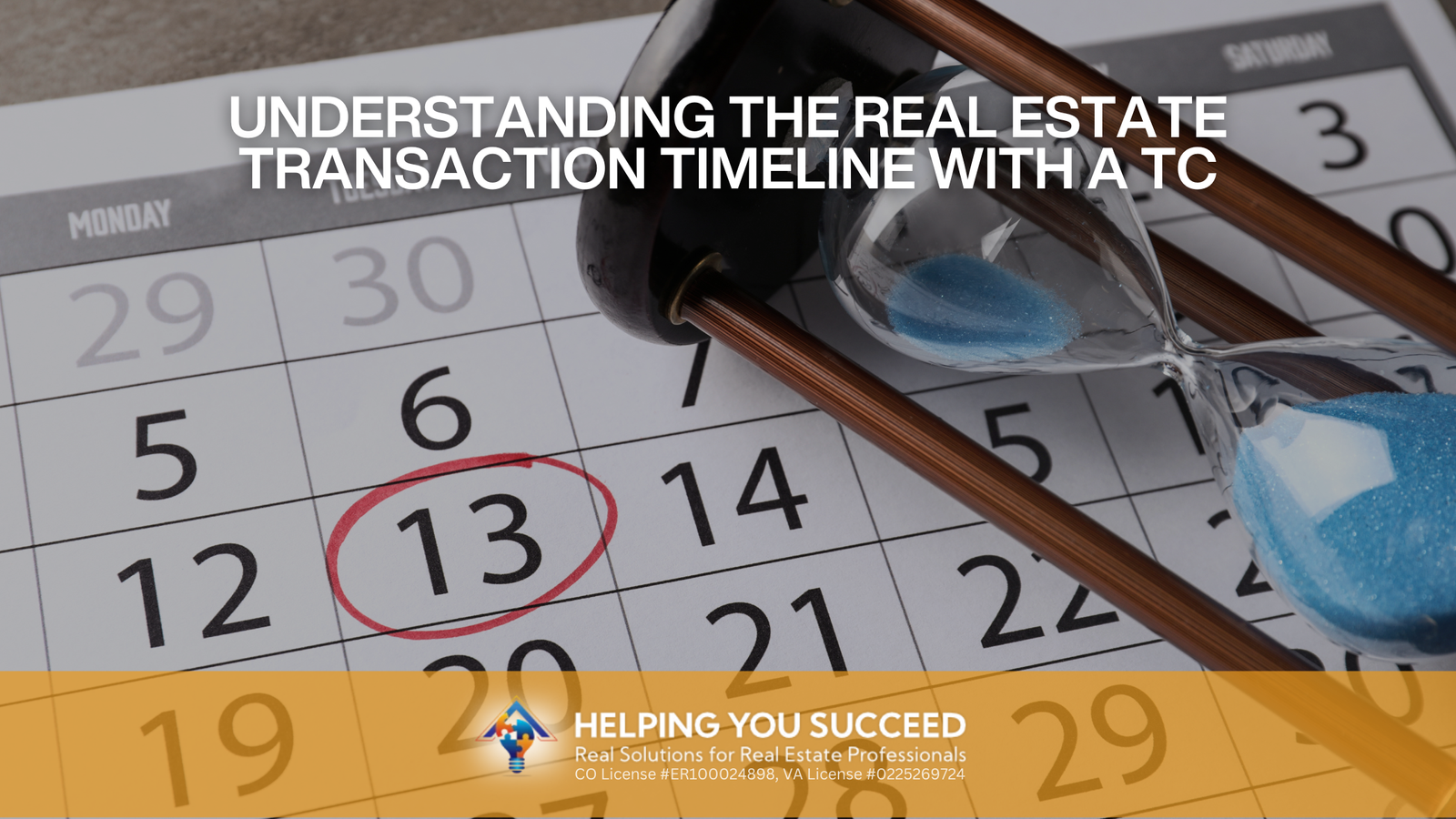Real estate transactions are exciting but complex processes filled with countless details, deadlines, and documents. While agents are the face of the client experience, much of the critical behind-the-scenes work that keeps deals moving forward falls on the shoulders of a Transaction Coordinator (TC). If you’ve ever wondered how deals progress smoothly from offer acceptance to closing day, the answer often lies in the seamless coordination by a TC.
In this article, we’ll break down the real estate transaction timeline and show you how working with a TC helps ensure every phase is handled efficiently, protecting your deals and your reputation.
The Offer Acceptance Stage
The real estate transaction timeline officially begins once the buyer’s offer is accepted by the seller. At this moment, a signed contract binds both parties to the agreed-upon terms. A transaction coordinator immediately steps in to review the contract, making sure every page, signature, initial, and date is complete. They catch and correct any omissions before they escalate into larger issues.
Beyond the paperwork, the TC also tracks all important deadlines outlined in the agreement, including contingency periods, inspection timelines, financing dates, and the final closing day. By establishing a clear schedule from the start, they ensure that no key dates are missed, setting the tone for a well-organized transaction.
Opening Escrow and Delivering the Earnest Money Deposit
After the contract review, the next key step is opening escrow and ensuring that the buyer delivers the earnest money deposit (EMD). The TC coordinates with the escrow officer to formally open the escrow account and then communicates with the buyer’s agent to confirm that the EMD is delivered within the agreed-upon timeframe.
They provide clear instructions to all parties regarding where and how the funds should be wired or dropped off. The TC tracks the receipt of the deposit and confirms that it has been documented correctly. This early attention to detail prevents misunderstandings that could otherwise derail the transaction.
Managing Contingency Periods
Contingencies protect both buyers and sellers during the real estate transaction and must be carefully managed. Common contingencies include the home inspection, appraisal, and loan approval periods. Missing a contingency deadline can void the deal or expose clients to unnecessary risks.
At Helping You Succeed, our TCs carefully track each contingency period in our proprietary software and send out proactive reminders to the appropriate parties. If any issues arise, such as needed repairs or appraisal gaps, the TC assists in facilitating communication and paperwork adjustments to keep everything moving forward smoothly.
Coordinating Inspections and Negotiations
Home inspections are critical in the transaction timeline because they often lead to repair requests or further negotiations. The TC can assist in scheduling inspections quickly after the contract is signed, securing appointments that fit the timeline requirements.
Once inspections are completed, they help document any repair requests and amendments. They track deadlines for inspection responses and coordinate the submission of any repair agreements between the buyer and seller. By efficiently handling these details, the TC minimizes the risk of delays and miscommunication during a sensitive phase of the transaction.
Appraisal Management
If the buyer is financing the purchase, the appraisal is a crucial milestone. The transaction coordinator ensures that the lender orders the appraisal promptly. They communicate with the buyer’s agent and seller’s agent to coordinate dates and follow up on the delivery of the report.
Loan Approval and Commitment
Throughout the timeline, the transaction coordinator maintains constant communication with the buyer’s lender to verify that underwriting is proceeding smoothly. They collect any necessary documentation from the client and ensure it is delivered promptly to the lender.
When the loan is officially approved, the TC obtains the commitment letter and confirms that all financing contingencies are satisfied. By staying on top of the loan process, they help prevent last-minute financing surprises that can lead to failed closings.
Title and Escrow Coordination
Another critical component of the real estate transaction timeline is ensuring that title and escrow work are completed accurately and on schedule. The TC communicates regularly with the title company to verify that title searches, title insurance, and escrow instructions are completed.
They review title reports to identify any potential issues, such as liens or ownership disputes, and alert the agent if problems arise. By working closely with escrow officers, the TC ensures that all fees, payoffs, and closing documents are prepared correctly, minimizing the chances of closing day delays.
Preparing for Closing
As the transaction nears closing, the transaction coordinator’s attention to detail becomes even more crucial. They review the preliminary Settlement Statement to ensure that all charges, commissions, credits, and seller contributions match the terms of the contract. They also coordinate final walk-throughs, confirming property access and scheduling appointments that work for both buyers and sellers.
The TC provides the client with a clear list of what to bring to closing, such as IDs and final cashier’s checks, and double-checks that all parties know when and where the closing will take place. They liaise with the escrow company to ensure all final documents are ready for signatures, smoothing out any last-minute wrinkles.
Closing Day Management
On closing day, the transaction coordinator acts as the final safety net. They ensure that all required documents are signed correctly and that funds are transferred appropriately. If anything unexpected comes up, such as a missing signature or last-minute change to a settlement statement, the TC is ready to tackle it promptly.
Their vigilance ensures that the closing day experience feels seamless and celebratory for clients, rather than chaotic or stressful.
Post-Closing Duties
Even after the property changes hands, a TC’s job isn’t quite finished. They complete post-closing file audits, ensuring that all documents are accounted for, fully executed, and stored according to brokerage and legal standards. They submit the final transaction package to the agent’s broker and file everything securely for record-keeping.
In some cases, they also assist in updating CRM databases with transaction information. This follow-up work allows agents to move on to the next deal confidently, knowing their past transactions are fully wrapped up and compliant.
Why a Transaction Coordinator Is Essential to Your Timeline
Understanding the real estate transaction timeline with a TC makes it clear just how essential they are to a smooth, successful closing. Without a dedicated TC managing the multitude of deadlines, communications, and documents, even the most experienced agent could easily find themselves overwhelmed—or worse, facing a collapsed deal.
A skilled TC doesn’t just handle tasks; they proactively drive the transaction forward, protecting your clients’ interests and your professional reputation. They ensure that buyers and sellers feel supported throughout the process, while giving agents the freedom to focus on growing their business and delivering outstanding client service.
Whether you’re an agent closing a handful of deals or managing dozens per year, partnering with a transaction coordinator is one of the smartest decisions you can make to streamline your workflow and ensure every client experience is smooth, positive, and stress-free.
Ready to transform your transactions?
Visit Helping You Succeed and learn how our expert transaction coordinators can help you close faster, protect your clients, and build a stronger real estate business today.




